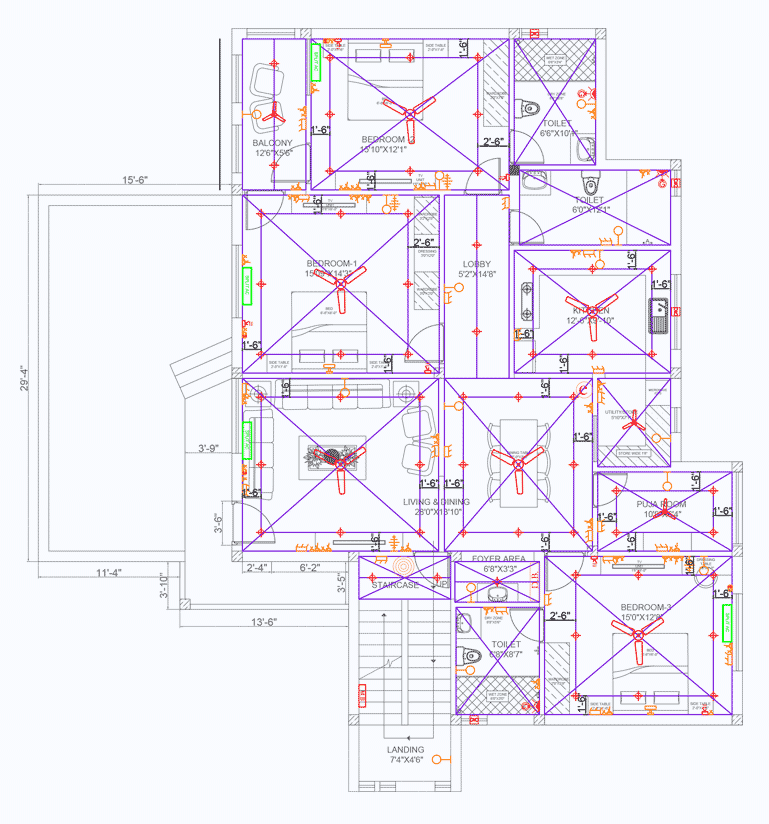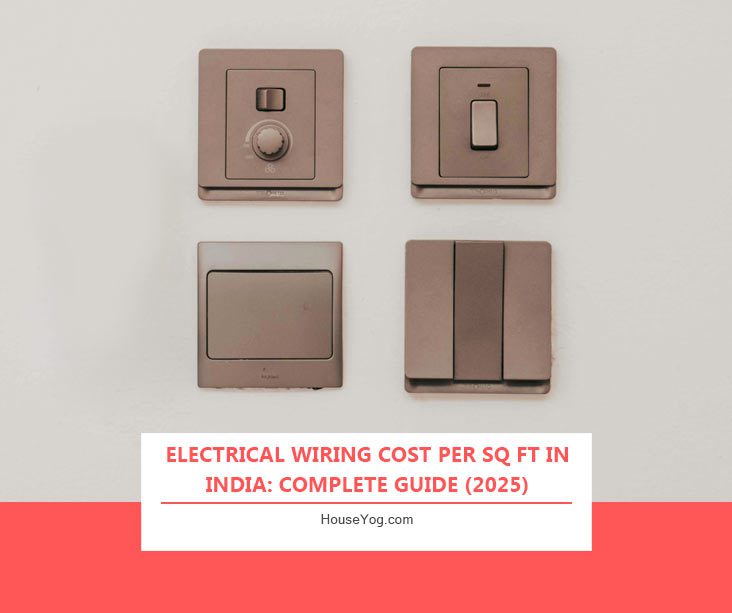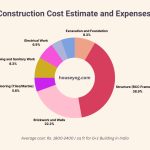Are you building a new home or renovating your existing one? One of the most important yet often underestimated cost heads in house construction is electrical wiring expenses. From the quality of wires to switches, fittings, and labour charges, the electrical cost per sq ft in India can vary widely based on your utility requirements, brand and material preferences and layout complexity.
In this cost guide, we break down:
- Average electrical cost per sq ft in India
- Key components and price ranges
- Factors that affect the total electrical budget
- Wiring types and load requirements
- Real-world examples and cost-saving tips
Whether you’re planning a modest 2BHK or a multi-storey house, this guide will help you budget smartly and avoid surprises related to electrical wiring.
Average Electrical Cost Per Sq Ft in India (2026)
As of 2026, the average cost of electrical work in residential construction in India ranges between Rs. 20 to Rs. 50 per sq ft, depending on material quality, layout, and labour charges.
For basic projects like a standard 2BHK with limited power points and simple fittings, the cost remains on the lower end, around ₹20–₹25 per sq ft. However, if you’re working with an interior designer or opting for premium finishes, the number of switches, sockets, and electrical points will increase significantly. That naturally raises both the material and labour costs.
The most accurate way to estimate your electrical budget is by referring to a detailed electrical drawing. But here’s a quick reference chart to help you get a ballpark figure based on material selection and project complexity:
| Project Type | Electrical Cost Range (per sq ft) |
| Basic Wiring (2BHK) | ₹Rs. 20 – ₹30 |
| Standard Wiring | ₹Rs. 30 – ₹45 |
| Premium Wiring | ₹Rs. 45 – ₹55 |
For a 1,000 sq ft home, you may end up spending between Rs. 25,000 and Rs. 50,000 on electrical wiring, switches, boards, and labour charges.
These 2026 cost ranges are based on current material and labour trends; actual figures may vary by city, type of wiring, and number of electrical points.
2026 trend: Wireless/smart switch compatibility and surge protection add to costs but enhance safety and long-term value.
Electrical Wiring Costs in India – 2026 Ground Reality
Electrical wiring prices in India are influenced by material price trends (especially copper), labour wage changes, and local demand. While basic costs per sq ft remain similar to 2025, factors like increased modular switch use and more complex circuits have pushed typical projects slightly higher in many cities in 2026. So, always consult local electricians for updated price quotes based on your home layout, overall scope of work and size of the project.
What Does Electrical Wiring Cost Include?
When budgeting for electrical work, it’s important to understand that the total cost includes both materials and labour, and each of these components can vary depending on your project’s scale and finish quality.
From high-quality branded wires to modular switchboards, conduits, and labour charges, every element plays a role in determining the final cost.
For instance, a project using basic switches and low-power wiring will cost significantly less than one that involves premium fittings, concealed conduits, and higher load-bearing circuits (like for geysers and ACs).
Here’s a quick breakdown of the major components involved in typical residential electrical work in India:
1. Wires and Cables
These carry electricity throughout your home and must be of good quality to ensure safety and durability.
- Popular Brands: Polycab, Finolex, Havells
- Typical Cost: ₹7 – ₹15 per metre (varies by wire thickness and insulation type)
Tip: Use 1.0 mm for lighting, 2.5 mm for sockets, and 4.0 mm+ for high-load appliances like geysers or ACs.
2. Switches and Switchboards
Switches and sockets define both the functionality and look of your electrical setup. Modular designs are now common in modern homes.
- Popular Brands: Anchor by Panasonic, Legrand, GM Modular
- Typical Cost: ₹150 – ₹800 per unit (basic to high-end modular switches)
Modular switches are easier to install, look sleek, and last longer — though they cost more upfront.
3. Conduits and Junction Boxes
These protect wires inside walls and ceilings and ensure safe and organised installation.
- Types: PVC conduits (common), GI conduits (for added safety)
- Typical Cost: ₹500 – ₹1,500 per room (depending on room size and fitting density)
4. Labour Charges
Labour charges vary based on location, project complexity, and electrician experience.
- Typical Rate: ₹10 – ₹20 per sq ft across most Indian cities
- Influencing Factors: Number of switch points, type of fittings, concealed vs exposed wiring, and floor levels
Pro Tip: Always budget for 5%–10% extra for unexpected changes in switch positions, last-minute fitting upgrades, or additional electrical points during construction.
Material % vs Labour % in 2026: Materials (wires, conduits, switches) account for ~60–70% of cost, while labour is ~30–40%.


Factors Affecting Electrical Wiring Cost
When estimating the electrical cost per sq ft in India, it’s important to know that no two homes will have the same wiring expenses. The total cost depends on several practical factors, from the size and layout of your house to the number of appliances, type of switches, and quality of wiring used. Even regional labour rates and electrical load planning can significantly influence your budget.
Let’s explore the key factors that impact your overall electrical wiring cost:
1. House Size and Layout
More square footage = more wiring, switches, and points. A duplex will generally cost more per sq ft than a compact 2BHK.
2. Number of Points and Appliances
TV units, geysers, ACs, and home automation systems increase point count and wiring complexity.
3. Switch & Fitting Quality
Modular and premium switches (Legrand, Schneider, etc.) increase cost but offer better longevity and design.
4. Electrical Load Planning
Single-phase or 3-phase? Higher power loads (ACs, water heaters, etc.) need thicker gauge wires and better MCBs.
5. Labour Availability and Rates
Rates differ in metros vs. smaller towns. Experienced electricians may charge more but ensure safer work.
Wiring Types & Load Requirements
Choosing the right wiring type and planning your home’s electrical load is crucial for safety, efficiency, and long-term reliability. Different wires serve different power needs; here’s how to make the right selection based on your usage.
Common Wiring Types in India:
- FRLS Wires (Flame Retardant Low Smoke): Safer and more commonly used in modern homes.
- PVC Wires: Cost-effective but not ideal for high-load areas.
- Multistrand Copper Wires: Flexible and high-conductivity.
Load Calculation (Quick Example):
For a 3BHK:
- Lighting: 2 kW
- Kitchen + Geyser: 3 kW
- ACs + Fans: 3.5 kW
- Misc: 1.5 kW
- Total Load: 10 kW approx.
Choose wire thickness and MCB rating based on this.
Example: Electrical Cost Breakdown for 1000 Sq Ft Home
To help you understand how the electrical budget adds up in real scenarios, here’s a sample cost breakdown for a standard 1,000 sq ft home in India. These are approximate ballpark figures, assuming a moderate number of points and standard-quality fittings; actual costs may vary based on your layout, material choices, location, and electrician (labour charges).
| Component | Approx. Quantity | Rate (Rs.) | Cost (INR) |
| Copper wires (90m) | 15 rolls | 800/roll | Rs. 12,000 |
| Switches + sockets | 50 modules | 200 avg | Rs. 10,000 |
| MCB + DB Box | 1 full set | 4,000 | Rs. 4,000 |
| Labour ( | 1000 sq ft | 25/sq ft | Rs. 25,000 |
| Others (conduits etc.) | Lump sum | Rs. 3,000 | |
| Total (approx) | – | – | Rs. 54,000 |
Tips to Save on Electrical Work
Smart planning can help you significantly reduce your home electrical wiring cost per sq ft without cutting corners on safety or quality. From optimising switch placements to choosing the right wire sizes, here are some practical and budget-friendly tips to get the most value out of your electrical installation.
- Plan all switch points early to avoid rework
- Compare brands; avoid the cheapest wires
- Use 1.0mm for lights, 2.5mm for sockets, and 4mm+ for AC/geyser
- Ask your electrician for a load calculation to avoid future overload
- Buy materials in bulk to get better deals
FAQs on Electrical Wiring Cost
The electrical wiring cost in 2026 ranges between Rs. 20–Rs. 50 per sq ft, depending on brand, points, layout, and labour charges.
Yes, smart switches, automation hubs, and extra network points can increase per sq ft cost.
Typically ₹25,000–₹60,000 (varies by fittings and complexity).
Yes, absolutely. They add safety and durability, often justifying a higher upfront cost.
Final Thoughts & What You Should Remember
To sum it up, the electrical cost per sq ft in India typically ranges between Rs. 20 and Rs. 50, depending on factors like material quality, number of points, labour rates, and wiring complexity. If you’re opting for premium switches, smart home features, or 3-phase load systems, your total electrical cost can be significantly higher.
The key to avoiding budget shocks? Plan early, map out all switch points, choose materials wisely, and work with experienced electricians who follow safety standards.
At Houseyog, we assist homeowners across India in planning, estimating, and executing home construction projects, from the foundation to the final electrical fitting.
If you found this post helpful, share it with friends or bookmark it for your upcoming construction project!






